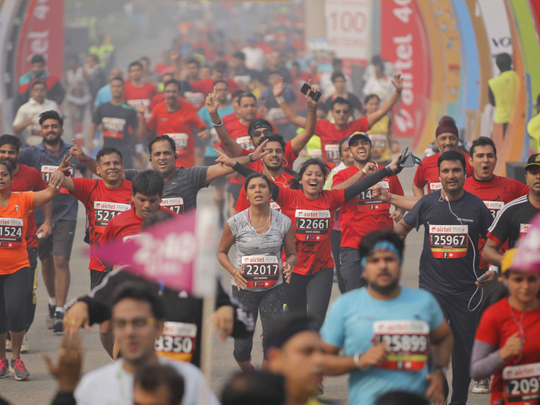
New Delhi: The tens of thousands of people who participated in Sunday’s half marathon in India’s capital had more than just running 21 kilometres through New Delhi’s streets on a misty, chilly morning to contend with — they also had to overcome the air pollution levels in the city that have been ranked the highest in the world.
Last year, the World Health Organisation named New Delhi the world’s most polluted city. Twelve other Indian cities ranked among the world’s most polluted 20.
On Sunday, most of New Delhi’s government-run air quality monitoring stations were showing “very poor” readings, posing an additional challenge for those taking part in the annual half marathon.
More than 30,000 people participated in the race, according to the Press Trust of India, or PTI. Two runners were seen being taken to ambulances, but it was not known why they needed medical attention.
Still, the event proceeded in a carnival atmosphere, with Ethiopia’s Birhanu Legese and Kenya’s Cynthia Limo winning the men’s and women’s elite categories.
“It is my first time in Delhi, and I have come up with a personal best,” PTI quoted Legese, who finished in 59 minutes, 20 seconds, as saying. “It is even more satisfying considering the top six were so close.”
Levels of PM2.5 — the very fine particles that get lodged deep in the lungs and cause the most damage — crossed the 300 mark at some places in New Delhi, but very few runners wore pollution masks during the race.
“I’ve never tried to run with a mask. The idea of wearing one for the race seems uncomfortable,” said one of the runners, Shruti Saxena, a 41-year-old businesswoman who has been participating in distance running events in New Delhi for eight years. “We’re breathing the same air even if we stop running, and I’d rather run than not.”
The Delhi half marathon, in its 10th year, has become an important part of the city’s calendar. The race, and the international runners it attracts, has encouraged a culture of running in a country where for decades the odd cricket game on the weekend was the most exercise most people got. Running groups are now gaining in popularity across the country.
The US Embassy’s air quality monitor, located in one of the greenest parts of the city, showed a reading of 283 this weekend, deemed so hazardous that the embassy advised that everyone avoid outdoor activities. The readings were nearly five times higher than what India deems acceptable and 11 times what’s recommended by the World Health Organisation.
The race is typically scheduled for late October or November, when the air is cooler and the scorching north Indian summer has ended. But the cold weather also leads to spikes in smog levels.
“It’s a public health catastrophe,” said Akshay Jaitley, a lawyer and longtime distance runner who has competed in races all over the world and ran in Sunday’s half marathon.
“You can feel the difference,” he said of training and running races in cities like Boston and London.
But he said he would continue to run in India’s capital. “The benefits of running are more than not running,” he said.












